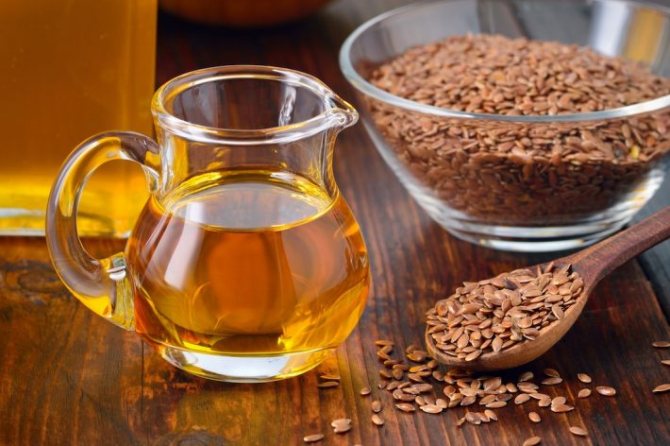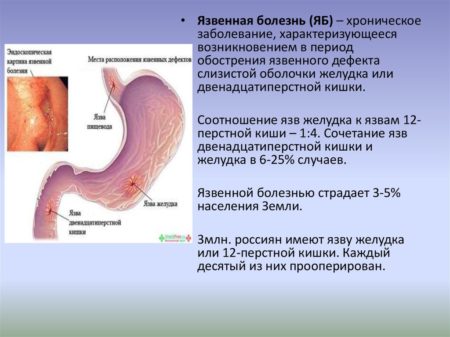Plant oil extracts are known not only in the cosmetics industry and cooking, but also as nutritional and medicinal products. In particular, stomach oil provides valuable assistance in the prevention and treatment of diseases of the gastrointestinal tract. It has an enveloping property, useful for affected areas of tissue. With all the variety, you must choose the right dosage for the effectiveness of treatment.
How to take it correctly
Rules for the correct use of oil prepared from flax for inflammation of the gastric mucosa:
- Due to the effect of increasing the contractility of the muscles of internal organs, it is necessary to avoid use in case of diarrhea, impaired bile secretion (cholelithiasis),
- Use separately from choleretic drugs;
- This oil can be used in cold dishes. During any heat treatment, oil releases toxic substances;
- At the first signs of loose stools when using oil, it is necessary to reduce the dose or stop taking it altogether;
- At the beginning of use, select the minimum dose - 1 teaspoon per day, which can be drunk separately, after meals or added to dishes. The maximum permissible dose in 24 hours is 1 tablespoon;
- If allergic reactions occur, you must immediately stop taking it;
- In case of increased stomach acidity, use with caution (may provoke increased symptoms of diarrhea and indigestion);
- Can be mixed with honey and other types of oils.

Some of the beneficial properties
Can flaxseed oil cause stomach pain?
Flaxseed oil is known to many as a miracle cure. It helps to gain health and prolong youth. A huge list of positive qualities of this product makes it a popular product.
However, it is worth considering that flaxseed oil has contraindications and side effects. Therefore, before using it, it is worth considering all the properties of this product. When including it in your treatment regimen, be sure to consult your doctor.
Read on to learn more about the benefits and harms of this oil.
Product Features
As with any medicine, you must follow the instructions for using flaxseed oil. Otherwise, its benefits may result in harm to your body.
Flax is a plant that was used by humanity even in the most ancient times as a medicine. Hippocrates himself used it in the treatment of diseases. One of the most valuable substances created from flax is its oil.
Previously, this crop was widely grown in Rus'. Over time, interest in it began to disappear, as it became a costly area in agriculture. Today flax is grown as a medicinal crop.
Its oil is used everywhere for medicinal purposes.
Flaxseed oil, according to doctors, is one of the effective remedies for treating a whole list of pathologies. There have been many studies that have confirmed this.
Therefore, doctors began to actively use this amazing oil in their practice. Popular recognition of this product has also grown to unprecedented levels.
Everyone began to use it, regardless of what diseases they suffered from.
However, flaxseed oil also has side effects. Therefore, not every person can take it without negative consequences for the body. To understand whether or not to use this remedy, you need to consider its existing indications and contraindications.
Positive properties
The benefits of flaxseed oil for the body are undeniable. If you take it according to the instructions and as prescribed by your doctor, you can achieve good results. It contains many useful components. These are vitamins, microelements, phytoestrogens, macroelements, polyunsaturated fats, etc. They have a complex positive effect on the body.
By following the instructions for using flaxseed oil, you can achieve a general improvement in your condition. This product is taken not only for treatment, but also for prevention. The oil improves human immunity and the protective functions of the body. This allows you to quickly restore your own strength after an illness.
The oil reduces cholesterol and also prevents the formation of blood clots. This has a positive effect on the cardiovascular system. This remedy is also useful for hypertensive patients and eliminates the likelihood of developing atherosclerosis. It strengthens blood vessels.
The oil helps overcome constipation, and also improves the functioning of the stomach, even helps in healing stomach ulcers and a number of other gastrointestinal diseases. Its composition has a positive effect on the liver.
The presented remedy has a positive effect on the nervous system, helps cope with stress, and calms the nerves. It removes toxins and waste from the body, speeding up metabolism. Fat metabolism is normalized. When consuming flaxseed oil, calcium absorption increases.
The product has shown its effectiveness in cases of kidney problems. When applied to the skin, it heals wounds and scars. For psoriasis, oil can reduce the negative manifestations of this disease.
When consuming flaxseed oil internally, the functioning of the thyroid gland improves. It also helps relieve diabetes.
One of the positive effects of the oil is reducing the risk of developing cancer.
Since the composition strengthens blood vessels, including in the eye area, it improves vision. Also, in the treatment of asthma, the oil is used as part of complex therapy.
As noted in studies, this is a unique product that can significantly improve the functioning of almost all organs and systems. But even a useful product can be harmful if used incorrectly.
Side effects
It is also necessary to take into account contraindications and side effects of flaxseed oil. If you don't know about it, you can harm your body. There are a number of pathologies for which this drug is contraindicated. These include:
- intestinal polyp;
- blood diseases;
- chronic pancreatitis;
- gastritis due to increased acidity;
- haemorrhoids;
- acute gallbladder diseases;
- cholecystitis.
If you feel nauseous after taking flaxseed oil or have any unpleasant sensations, you should stop taking it. Be sure to contact your healthcare provider. Feeling unwell after taking this product indicates the presence of serious illnesses.
If you are wondering whether you can drink flaxseed oil if you have gastritis, ask your doctor. He will answer that this is not the best solution. This product should not be taken if you have gastritis. Therefore, if your stomach hurts after taking flaxseed oil, this is a clear sign of pathology in this section of the gastrointestinal tract.
Expectant mothers and nursing mothers are also sometimes prohibited from taking this drug. If a woman is at risk of miscarriage, oil will only worsen the situation. Therefore, consult your gynecologist regarding such dietary supplement. If your pregnancy is progressing normally and you have no contraindications, your doctor may allow you to take this medication.
But if you experience a bitter taste in your mouth after taking flaxseed oil during pregnancy or breastfeeding, you should stop taking it. During lactation, taking this drug is also quite often prohibited.
It is worth considering that bleeding may occur when taking this oil. During breastfeeding, some of its components pass into the milk. The newborn’s body is not yet able to digest them. This can cause problems.
Children can use this oil from the age of 3, but only after consulting a pediatrician.
If you are taking antiviral, antibacterial, contraceptive medications, or anticoagulants, flaxseed oil is contraindicated. Their effect will decrease and bleeding may occur.
Possible harm
There are various contraindications and side effects of flaxseed oil. In order not to harm your body, it is important to follow the appropriate dosage of this product.
Please note that the largest allowable dose is 2 tbsp. spoons of oil per day. This is the dosage for a heavy adult.
Due to exceeding the dosage, negative consequences from taking the drug may be observed.
When considering contraindications and side effects of flaxseed oil, it is also worth noting possible allergies, abdominal pain, bloating and diarrhea. At the same time, patients note that the disease can worsen and the condition sharply worsen.
In addition, following the rules of the instructions implies that you need to not only adhere to the established dosage. It is important not to heat it. It is strictly forbidden to fry this product, or add it to hot dishes, etc. When heated, substances hazardous to health are formed - free radicals. Because of them, unwanted processes occur in the body.
Source: https://menchov.ru/mozhet-li-ot-lnjanogo-masla-bolet-zhivot/
With increased acidity
Note! There is no panacea for chronic gastritis; treatment is long-term, including changes in diet and lifestyle.
One of the problems with hyperacidity is the occurrence of heartburn, provoked by the reflux of stomach contents into the esophagus. Acidic gastric juice easily injures not only its own mucosa, leading to inflammation, but also the mucous membrane of the esophagus, due to which the inflammatory process also develops.
The benefits for the stomach of taking vegetable oils are to reduce the intensity of reflux without changing acidity. A protective film is also formed on the wall of the stomach, which acts as a barrier between the mucous membrane and acid, which reduces the intensity of damage caused by high acidity.
Important to remember! There is a complication in the form of diarrhea, which, when combining a symptom of the disease and a complication of treatment, can be massive. This condition causes dehydration and electrolyte imbalance.
To avoid unpleasant side symptoms, you should consult your doctor before initiating treatment with folk remedies.

Prevention of gastritis
The effectiveness of using flaxseed oil for the stomach
Regular intake of flaxseed oil improves peristalsis (contraction) of the stomach walls. It promotes better digestion of food, absorption of nutrients and natural elimination of toxins. The product envelops the walls of the stomach and acts as a barrier against hydrochloric acid and aggressive foods.
The folk remedy has bactericidal and anti-inflammatory properties. This is especially valuable in the treatment of advanced and chronic diseases, erosive gastritis.
There is no need to buy flaxseed oil, because it can be prepared at home. Select smooth and healthy seeds and squeeze them using a juicer.

At low
Is it possible to drink oil for gastritis with characteristic hypoacidity? Yes, you can. Due to its ability to speed up the gastrointestinal tract, it is used to relieve the following symptoms of this type of gastritis:
- Periodic constipation followed by diarrhea;
- Bloating (increased fermentation of food due to impaired secretion of digestive enzymes);
- Dysbacteriosis, causing diarrhea due to constipation;
- Feeling of discomfort, pain;
- Weight loss, hypovitaminosis.
Must remember! The effect does not occur instantly; you can combine the use of oil with other laxatives, but in smaller doses, this will allow you to avoid a large number of chemical medications with the same effect.
In case of an overdose of laxatives, diarrhea may begin, worsening the patient’s general condition. All drugs are canceled, activated carbon is used, as well as other drugs that strengthen the stool.
No less important information about the use of plantain for gastritis
Causes and types of constipation
Depending on the reason that provoked the appearance of constipation, the following types of this pathological process are distinguished:
- Nutritional. Constipation occurs as a result of eating excess amounts of starchy and sweet foods. Disruption of the digestive process, which leads to retention of feces in the body, often occurs in people due to their refusal to eat a proper diet.
- Proctogenic. Violation of the evacuation function of the intestine occurs under the influence of decreased sensitivity of the rectum. This pathology is provoked by anal fissures, hemorrhoids, etc.
- Mechanical. Inflammatory adhesions, polyps, volvulus, kinks and other similar pathologies can cause constipation.
- Hypodynamic. Constipation occurs as a result of decreased physical activity.
- Neurogenic. Diagnosed in patients who, for some reason, are trying to restrain the urge to have a bowel movement. Neurogenic constipation can be the result of diseases of the nervous system (psychoneurosis, encephalitis, tabes dorsalis, progressive paralysis, etc.).
- Spicy. It is formed under the influence of inflammatory processes localized in the intestines.
- Endocrine. Often diagnosed in patients who suffer from diseases caused by disruption of the normal functioning of the thyroid gland. Endocrine constipation can occur during menopause, diabetes, hormonal imbalance, etc.
- Medication. Problems with stool appear after taking certain medications.
We recommend that you read: The healing properties of red clover flowers

For ulcers and erosive gastritis
One of the complications of chronic inflammation of the stomach is ulcerative lesions and erosion leading to complications:
- Bleeding;
- Perforation and penetration of stomach contents into the abdominal cavity;
- Penetration into neighboring tissues and organs;
- The appearance of a malignant formation at the site of the ulcer;
- Metabolic disorders, anemia, hypovitaminosis.
To avoid such complications, it is necessary to prevent the formation of erosions, which are the first stage of peptic ulcer disease.

Pathogenesis of reflux
All types of gastritis lead to damage not only to the mucous layer, but also to deeper layers, leading to ulceration.
To prevent this, it is necessary to properly treat gastritis:
- Reduce the frequency of exacerbations;
- Maintain a therapeutic diet;
- Avoid stress;
- Quit alcohol and tobacco;
- Consult your doctor.
Diet is the most important part of prevention. Proper nutrition can easily keep gastritis in remission permanently, without complications.
Flaxseed oil contains useful substances for the following purposes:
- Protects the mucous membrane from damage;
- Improves gastric contraction;
- The body is supplied with useful microelements and vitamins;
- Stabilizes the chair.

Peptic ulcer disease, definition and epidemiology
What to remember
- Flaxseed oil does not replace a professional course of treatment prescribed by a doctor.
- Do not heat or boil the oil so that it does not lose its healing properties and does not harm the body.
- For chronic gastrointestinal diseases, get approval to use flaxseed oil from your doctor.
- Do not use the oil if there are contraindications.
- To alleviate the condition during exacerbations and prevent relapses, drink pure flaxseed oil daily in small portions, mix with other oils, or prepare decoctions and jelly from seeds or flour.
Source: anukapohudei.ru
Beneficial features
Is the use of flaxseed oil beneficial for the stomach? The list of constituent elements and beneficial properties will indicate:
- Unsaturated fatty acids (Omega-3), essential substances for maintaining immunity and the functioning of internal organs;
- Vitamin E (an essential vitamin for maintaining the health of the reproductive system);
- Folic acid (participates in protein synthesis);
- B vitamins (essential substances for the immune, cardiovascular, and nervous systems);
- Vitamin D (necessary for the functioning of the heart, kidneys, bone structure, teeth);
- Estrogen-like phytohormones (substances from the group of plant hormones that improve hormonal levels).










